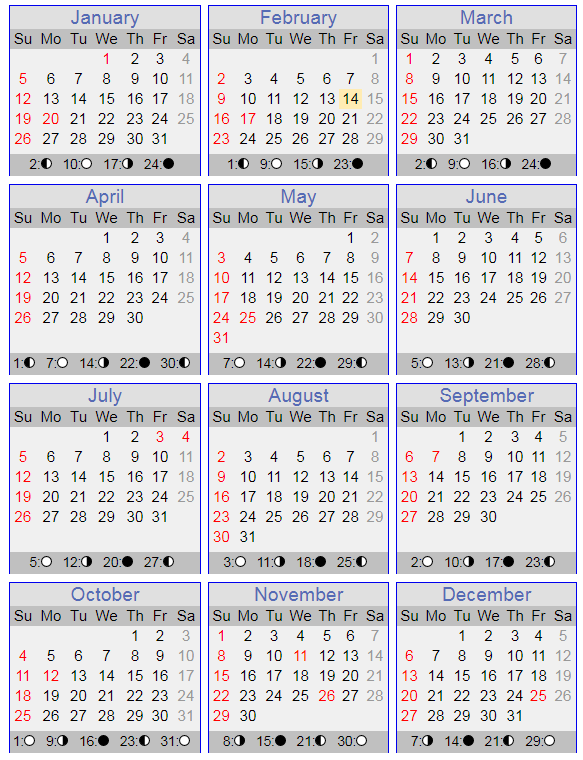

Scared of Friday the 13th? An irrational fear of this date is called friggatriskaidekaphobia (Frigga is the Norse goddess for whom Friday is named). Image via Kelli Marshall.
Friday, November 13, 2020, presents the second of two Friday the 13ths in 2020. Any calendar year has a minimum of one Friday the 13th, and a maximum of three Friday the 13ths. The last time we had only one Friday the 13th in a calendar year was in May 2016 and the next time won’t be until August 2021. Three Friday the 13ths last took place in 2015 (February, March, November), and will next happen in 2026 (February, March, November). This year, 2020, has two Friday the 13ths: March and November.
Not that we at EarthSky suffer from friggatriskaidekaphobia – an irrational fear of Friday the 13th – but, gosh darn, the Friday the 13th of November 2020 occurs exactly 39 (3 x 13) weeks before next year’s sole Friday the 13th on August 13, 2021.
And that’s after this year’s first Friday the 13th – March 13, 2020 – happened exactly 13 weeks after the previous Friday the 13th in December 2019.
Or we could look ahead to the year 2022. That year’s sole Friday the 13th on May 13, 2022, will come exactly 39 (3 x 13) weeks after the Friday the 13th on August 13, 2021.
Yikes, these few coincidences involving the number 13 are only the tip of the iceberg. We could cite many more …
Keep reading to investigate the intriguing mathematics behind Friday the 13th and the calendar.

Gioachino Rossini, a 19th century Italian composer. Folklorists say there's no written evidence that Friday the 13th was considered unlucky before the 19th century. The earliest known documented reference in English appears to be in Henry Sutherland Edwards' 1869 biography of Rossini.
Are all these Friday the 13ths a super coincidence? Super unlucky? Neither. They’re just a quirk of our calendar.
According to folklorists, there’s no written evidence that Friday the 13th was considered unlucky before the 19th century. The earliest known documented reference in English appears to be in Henry Sutherland Edwards’ 1869 biography of Gioachino Rossini.
Still, Friday has always gotten a bad rap. In the Middle Ages, people would not marry – or set out on a journey – on a Friday.
There are also some links between Christianity and an ill association with either Fridays or the number 13. Jesus was said to be crucified on a Friday. Seating 13 people at a table was seen as bad luck because Judas Iscariot, the disciple who betrayed Jesus, is said to have been the 13th guest at the Last Supper. Meanwhile, our word for Friday comes from Frigga, an ancient Scandinavian fertility and love goddess. Christians called Frigga a witch and Friday the witches’ Sabbath.
In modern times, the slasher-movie franchise Friday the 13th has helped keep friggatriskaidekaphobia alive.

The Friday the 13th slasher-movie franchise helped this day maintain its notoriety. Image via Wikimedia Commons.
We have two Friday the 13ths in 2020 – in March and November – because 2020 is a leap year of 366 days that starts on a Wednesday. Whenever a leap year of 366 days starts on a Wednesday, it’s inevitable that the months of March and November will start on a Sunday. And any month starting on a Sunday will have a Friday the 13th.
Calendar for 2020

Calendar for the year 2020 via timeanddate.com
The last time a leap year started on a Wednesday was 28 years ago, in the year 1992, and the next time will be 28 years from 2020, in the year 2048. The final leap year to begin on a Wednesday in the 21st century (2001 to 2100) will occur 28 years after 2048, in the year 2076.
In the 21st century (2001 to 2100), we have a total of three leap years starting on a Wednesday: 2020, 2048 and 2076.
In addition, when any common year of 365 days begins on a Thursday, there are three Friday the 13ths: February, March and November. This triple header last happened five years ago, in February, March and November of 2015, and will next happen six years from 2020, in the February, March and November of 2026.
In a common year of 365 days, the weekdays and calendar dates in February always match the first 28 days of March. So any common year sporting a Friday the 13th in February always features a Friday the 13th in March.
In any year, whether it be a leap year or a common year, the first 30 days of March always match all 30 days of November. So any year having a Friday the 13th in March will also have a Friday the 13th in November.
Some of you may wonder if there’s some formula that governs how this Friday the 13th drama repeats itself. The answer is yes!
These triple February-March-November Friday the 13th common years come exactly 6, 17 and 23 years after a March-November Friday the 13th leap year, which recurs in periods of 28 years for the rest of the 21st century (2001 to 2100). Hence:
1992 (March-November Friday the 13th leap year)
1992 + 6 = 1998 (February-March-November common year)
1992 + 17 = 2009 (February-March-November common year)
1992 + 23 = 2015 (February-March-November common year)2020 (March-November Friday the 13th leap year)
2020 + 6 = 2026 (February-March-November common year)
2020 + 17 = 2037 (February-March-November common year)
2020 + 23 = 2043 (February-March-November common year)2048 (March-November Friday the 13th leap year)
2048 + 6 = 2054 (February-March-November common year)
2048 + 17 = 2065 (February-March-November common year)
2048 + 23 = 2071 (February-March-November common year)2076 (March-November Friday the 13th leap year)
2076 + 6 = 2082 (February-March-November common year)
2076 + 17 = 2093 (February-March-November common year)
2076 + 23 = 2099 (February-March-November common year)
As magical as all of this Friday the 13th calendar intrigue appears to be, it’s not supernatural. It’s entertaining number play, even if it may haunt our uncomprehending minds.

“… and whether or not it is clear to you, the universe is unfolding as it should.” Resin, acrylic paint and archival print on transparency on panel, by Boston artist Jessica Dunegan.
Read more: A year with 13 Friday the 13ths?
Bottom line: November 13, 2020, is the second of 2020’s two Friday the 13ths. This Friday the 13th comes exactly 39 weeks – that is, the number 3 multiplied by the number 13 – before the next Friday the 13th on August 13, 2021.
from EarthSky https://ift.tt/2PK7tUJ


Scared of Friday the 13th? An irrational fear of this date is called friggatriskaidekaphobia (Frigga is the Norse goddess for whom Friday is named). Image via Kelli Marshall.
Friday, November 13, 2020, presents the second of two Friday the 13ths in 2020. Any calendar year has a minimum of one Friday the 13th, and a maximum of three Friday the 13ths. The last time we had only one Friday the 13th in a calendar year was in May 2016 and the next time won’t be until August 2021. Three Friday the 13ths last took place in 2015 (February, March, November), and will next happen in 2026 (February, March, November). This year, 2020, has two Friday the 13ths: March and November.
Not that we at EarthSky suffer from friggatriskaidekaphobia – an irrational fear of Friday the 13th – but, gosh darn, the Friday the 13th of November 2020 occurs exactly 39 (3 x 13) weeks before next year’s sole Friday the 13th on August 13, 2021.
And that’s after this year’s first Friday the 13th – March 13, 2020 – happened exactly 13 weeks after the previous Friday the 13th in December 2019.
Or we could look ahead to the year 2022. That year’s sole Friday the 13th on May 13, 2022, will come exactly 39 (3 x 13) weeks after the Friday the 13th on August 13, 2021.
Yikes, these few coincidences involving the number 13 are only the tip of the iceberg. We could cite many more …
Keep reading to investigate the intriguing mathematics behind Friday the 13th and the calendar.

Gioachino Rossini, a 19th century Italian composer. Folklorists say there's no written evidence that Friday the 13th was considered unlucky before the 19th century. The earliest known documented reference in English appears to be in Henry Sutherland Edwards' 1869 biography of Rossini.
Are all these Friday the 13ths a super coincidence? Super unlucky? Neither. They’re just a quirk of our calendar.
According to folklorists, there’s no written evidence that Friday the 13th was considered unlucky before the 19th century. The earliest known documented reference in English appears to be in Henry Sutherland Edwards’ 1869 biography of Gioachino Rossini.
Still, Friday has always gotten a bad rap. In the Middle Ages, people would not marry – or set out on a journey – on a Friday.
There are also some links between Christianity and an ill association with either Fridays or the number 13. Jesus was said to be crucified on a Friday. Seating 13 people at a table was seen as bad luck because Judas Iscariot, the disciple who betrayed Jesus, is said to have been the 13th guest at the Last Supper. Meanwhile, our word for Friday comes from Frigga, an ancient Scandinavian fertility and love goddess. Christians called Frigga a witch and Friday the witches’ Sabbath.
In modern times, the slasher-movie franchise Friday the 13th has helped keep friggatriskaidekaphobia alive.

The Friday the 13th slasher-movie franchise helped this day maintain its notoriety. Image via Wikimedia Commons.
We have two Friday the 13ths in 2020 – in March and November – because 2020 is a leap year of 366 days that starts on a Wednesday. Whenever a leap year of 366 days starts on a Wednesday, it’s inevitable that the months of March and November will start on a Sunday. And any month starting on a Sunday will have a Friday the 13th.
Calendar for 2020

Calendar for the year 2020 via timeanddate.com
The last time a leap year started on a Wednesday was 28 years ago, in the year 1992, and the next time will be 28 years from 2020, in the year 2048. The final leap year to begin on a Wednesday in the 21st century (2001 to 2100) will occur 28 years after 2048, in the year 2076.
In the 21st century (2001 to 2100), we have a total of three leap years starting on a Wednesday: 2020, 2048 and 2076.
In addition, when any common year of 365 days begins on a Thursday, there are three Friday the 13ths: February, March and November. This triple header last happened five years ago, in February, March and November of 2015, and will next happen six years from 2020, in the February, March and November of 2026.
In a common year of 365 days, the weekdays and calendar dates in February always match the first 28 days of March. So any common year sporting a Friday the 13th in February always features a Friday the 13th in March.
In any year, whether it be a leap year or a common year, the first 30 days of March always match all 30 days of November. So any year having a Friday the 13th in March will also have a Friday the 13th in November.
Some of you may wonder if there’s some formula that governs how this Friday the 13th drama repeats itself. The answer is yes!
These triple February-March-November Friday the 13th common years come exactly 6, 17 and 23 years after a March-November Friday the 13th leap year, which recurs in periods of 28 years for the rest of the 21st century (2001 to 2100). Hence:
1992 (March-November Friday the 13th leap year)
1992 + 6 = 1998 (February-March-November common year)
1992 + 17 = 2009 (February-March-November common year)
1992 + 23 = 2015 (February-March-November common year)2020 (March-November Friday the 13th leap year)
2020 + 6 = 2026 (February-March-November common year)
2020 + 17 = 2037 (February-March-November common year)
2020 + 23 = 2043 (February-March-November common year)2048 (March-November Friday the 13th leap year)
2048 + 6 = 2054 (February-March-November common year)
2048 + 17 = 2065 (February-March-November common year)
2048 + 23 = 2071 (February-March-November common year)2076 (March-November Friday the 13th leap year)
2076 + 6 = 2082 (February-March-November common year)
2076 + 17 = 2093 (February-March-November common year)
2076 + 23 = 2099 (February-March-November common year)
As magical as all of this Friday the 13th calendar intrigue appears to be, it’s not supernatural. It’s entertaining number play, even if it may haunt our uncomprehending minds.

“… and whether or not it is clear to you, the universe is unfolding as it should.” Resin, acrylic paint and archival print on transparency on panel, by Boston artist Jessica Dunegan.
Read more: A year with 13 Friday the 13ths?
Bottom line: November 13, 2020, is the second of 2020’s two Friday the 13ths. This Friday the 13th comes exactly 39 weeks – that is, the number 3 multiplied by the number 13 – before the next Friday the 13th on August 13, 2021.
from EarthSky https://ift.tt/2PK7tUJ

Aucun commentaire:
Enregistrer un commentaire